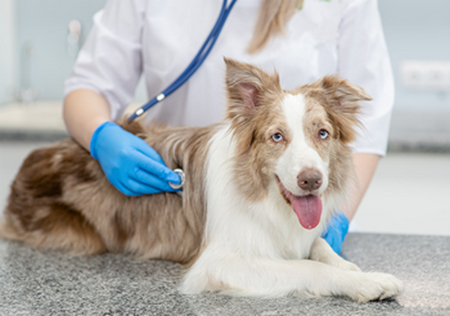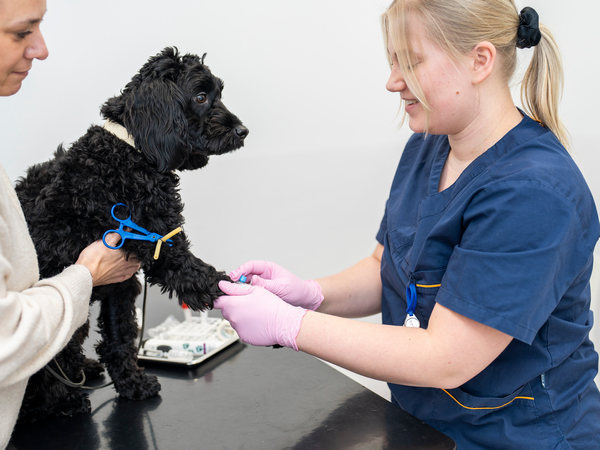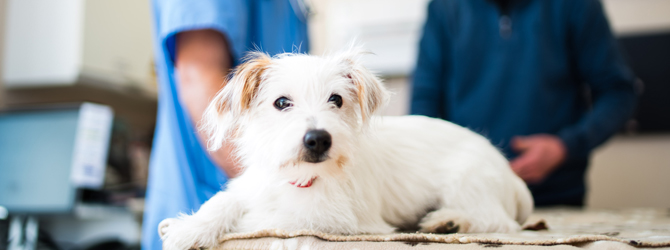Addressing Renal Disease in Dogs: Navigating Canine Kidney Failure
Your dog’s kidneys are hardworking organs that play an important part in keeping your pet healthy.
As well as removing toxins and helping to produce the hormones needed to produce red blood cells, the kidneys also help maintain your dog’s blood pressure.
With so much to do, it’s common for a dog’s kidneys to stop working properly as they age.
Brief summary
- Kidney disease covers all kidney issues; kidney failure means they can't function properly.
- Causes includes age, diet, infections, kidney stones, certain medicines, and poisons.
- Symptoms include increased thirst and urination, appetite loss, vomiting, and lethargy.
- Treatment involves diet changes, fluid therapy, medications, and regular vet check-ups.
What’s the difference between kidney failure and kidney disease in dogs?
Kidney disease refers to any illness that affects the kidneys. This may include poisons, infections and cancers. Kidney failure is when the kidneys are no longer working well enough to perform their functions properly. This can be acute (occurs very quickly and suddenly) or chronic (a gradual decrease in function, often with age).
Will my dog eventually develop kidney failure?
Kidney failure can be caused by your dog’s age, infection, tumour, or even because your dog’s eaten something poisonous. It can cause serious damage to the kidneys, which may be either permanent or reversible, depending on the cause.
Chronic kidney failure, sometimes called chronic renal failure or CRF, is one of the most common causes of illness and death in dogs aged seven and older. Younger dogs can also develop the condition, though this is less common. It is fairly common for very senior dogs to have some degree of kidney dysfunction, although the amount of impairment varies.
What causes kidney failure in dogs?
Kidney failure in dogs is a serious issue, and it's good that you're looking into it. Knowing the causes can help you keep your dog as healthy as possible. So, let's dive in.
Age
Just like people, dogs can have health problems as they get older. Kidney failure is more common in older dogs.
Diet
Your dog’s diet matters. Some foods can be really hard on your dog's kidneys. Always ensure you're feeding your dog food that's good for them. It’s important to change your dog’s diet as they age so they can always receive the best nutrients for their life stage.
Infections and diseases
Sometimes, dogs can get infections or diseases that affect their kidneys. These can include any of the following:
Leptospirosis
This is a bacterial infection that dogs can get from water or soil contaminated by infected animals. It can seriously harm the kidneys if not treated quickly. There is a vaccine to prevent this disease.
Lyme disease
Ticks can carry this disease, sometimes leading to kidney problems. If you live in an area where ticks are common, check your dog regularly.
Pyelonephritis
This is a fancy name for a urinary tract infection that's spread to the kidneys. Bacteria usually cause it and need to be treated as soon as possible.
Glomerulonephritis
This is an inflammation of the tiny filters in the kidneys. Other diseases like heartworm or Lyme disease can cause it.
Kidney stones
Just like people, dogs can get kidney stones. These can block urine flow and cause infections, leading to kidney failure if not treated.
Medicines
Some medicines can be tough on your dog's kidneys. If your dog needs medication, talk to your vet about any side effects.
Poisons
Antifreeze, certain plants, and some human foods can poison dogs and hurt their kidneys. Always keep an eye on what your dog is getting into.
Symptoms of kidney disease in dogs
If you notice your dog going to the toilet more often and drinking more to compensate for the lost fluids, this may be a sign that their kidneys are struggling to work properly. Kidney disease can also put dogs off their food or make them sick, tired and lethargic.
Treating kidney failure in dogs
Kidney disease in dogs isn’t always reversible, but it can often be managed in those cases that aren’t. First, if you think your dog has kidney issues, you must take them to the vet. They can do blood and urine tests to see what's going on and give you the best advice for treatment.
Diet changes
One of the first things most vets recommend is a change in diet. Foods that are highly digestible and low in protein and phosphorus can help take some of the strain off your dog's kidneys.
Fluid therapy
Sometimes, dogs with kidney failure need extra fluids. This can be done at the vet's office; sometimes, you can even do it at home once you've been shown how.
Medicines
If infection or inflammation is the cause of the kidney disease, antibiotics or anti-inflammatories will be prescribed for your dog. Kidney disease can also make your dog feel sick, have electrolyte imbalances and alter their blood pressure. Your dog may require medicine to manage these related problems and improve their well-being.
Regular check-ups
Once your dog has been diagnosed with kidney failure, you'll need to go back to the vet regularly. They'll probably want to do more tests to see how things are going, monitor related problems such as blood pressure, and decide if any changes need to be made to the treatment plan.

Quality of life
Sometimes, despite all the best treatments, kidney failure can get to a point where it's affecting your dog's quality of life. If that happens, you'll need to talk seriously with your vet about the best way to keep your dog comfortable.
“Chronic kidney failure – sometimes called chronic renal failure, or CRF – is one of the most common causes of illness and death in dogs aged seven and older.”
Is renal disease the same as kidney failure?
Renal disease and kidney disease are the same thing. The word "renal" is just a medical term to talk about anything related to the kidneys. So when you hear "renal disease," it means there's something wrong with the kidneys.
Why do some people say 'renal'?
Medical people like vets and doctors sometimes use the word 'renal' because it's the technical term. But whether you hear "renal disease" or "kidney disease," they're talking about the same issue.
What is the best diet for dogs with kidney disease?
Diet is a big deal when it comes to managing kidney disease in dogs. A good diet can have lasting effects on your dog’s quality of life, and a bad diet can make things worse.
Why diet matters
When a dog has kidney disease, their kidneys aren't doing a good enough job of filtering stuff out of the blood. The right diet can help take some of the load off the kidneys.
Low protein
One of the first things vets usually recommend is a diet low in protein or highly digestible protein content. Protein molecules are large and can inflict further damage on struggling kidneys. But remember, your dog still needs some protein, so don't cut it out completely.
Low phosphorus
If your dog’s kidneys aren’t working well, they may struggle to filter molecules such as phosphorus out of the blood, meaning levels can rise high and cause problems. This can be managed by ensuring less phosphorus enters your dog via the diet. Foods that are low in phosphorus are often recommended for dogs with kidney issues.
Less salt
Salty foods can also put a strain on the kidneys and aren’t recommended.
Wet food
Hydration is really important for dogs with kidney disease. Wet food provides a high moisture content, so is recommended for renal patients. It can also be more tempting to dogs whose appetite has been affected.
What are the stages of kidney disease in dogs?
Understanding the stages of kidney disease in dogs can really help you know what to expect and how to best care for your dog. So let's break it down.
Stage 1: Early signs
In this stage, you might not even notice anything is wrong. Sometimes, the only way to catch it is through blood tests and urine tests at the vet. If you catch it this early, that's really good because you can start making changes to help your dog right away.

Stage 2: Mild disease
Now, you might start seeing some signs like your dog drinking more water and peeing more. They might also lose a bit of weight. At this point, your vet will probably recommend some changes to your dog's diet and possibly some medication.
Stage 3: Moderate disease
In this stage, the symptoms get more noticeable. Your dog might start to feel sick and not want to eat as much, and get tired more easily. Complications such as high blood pressure may develop and complicate matters. Your vet will likely want to do more tests and might change the treatment plan.
Stage 4: Severe disease
This is the most serious stage. Your dog will probably feel pretty poorly and may be struggling with vomiting, poor appetite, weight loss and excessive thirst. At this point, your vet will do everything they can to make your dog comfortable and manage the symptoms.
End-stage
This is when the kidneys are struggling, affecting your dog's quality of life. You'll need to have some serious talks with your vet about the best way to care for your dog in this tough time.
What to do at each stage
The most important thing is to work closely with your vet. They can do tests to determine what stage your dog is at and advise you on what to do next. This might include changes to your dog's diet, medicines, or other treatments.
What breeds are most likely to suffer from kidney disease?
Some breeds are more likely to suffer from kidney problems, usually due to genetic traits. Knowing which breeds are more likely to get kidney disease can help you be extra careful if you have one of those dogs. However, just because your dog is on the list doesn’t mean they’ll get kidney disease. Any dog, regardless of breed, can get kidney disease.
Breeds at higher risk
What can you do?
If you have a dog from one of these breeds, it doesn't mean they'll get kidney disease. But it does mean you should be extra careful. Make sure you go for regular vet check-ups and keep an eye out for any signs of kidney problems, like drinking lots of water or peeing more than usual.
And remember, any dog can get kidney disease, not just the breeds on this list. So, it's always a good idea to keep an eye on your dog's health, regardless of breed.
Is kidney failure in dogs painful?
It’s difficult to know if kidney failure is painful. Infections such as pyelonephritis can certainly cause pain, but chronic kidney failure may not. However, your dog will certainly be feeling sick, tired and unwell.
Caring for a dog with kidney disease at home
Caring for a dog with kidney failure at home is a big responsibility, but there are things you can do to make your dog more comfortable. Let's go through some of the ways you can help.
Follow the vet's advice
First and foremost, always follow your vet's advice. They'll give you the best plan for treating your dog's kidney failure, which might include medication, diet changes, and other treatments.
Change the diet
One of the most common recommendations is to switch to a kidney-friendly diet. This usually means food that's low in protein and phosphorus. Your vet can help you pick the right food for your dog. Your dog’s appetite may be poor, so encourage them to eat by warming the food, trying different flavours or textures or even hand-feeding.
Keep them hydrated
Dogs with kidney failure often need extra fluids. Provide plenty of water sources, switch to a wet diet and encourage regular drinking. Your vet might show you how to give your dog fluids under the skin at home. This can help keep them hydrated and feeling better.
Regular toilet breaks
Because they're drinking more water, they'll need to pee more. Make sure you give your dog plenty of chances to go outside.
Keep them comfy
Your dog might feel a bit rubbish, so make sure they have a comfy place to rest. Soft blankets and a quiet space can help them feel more relaxed.
Monitor symptoms
Keep an eye on how your dog is doing. If you notice new symptoms or if they seem to be getting worse, it's time for another vet visit.
Regular vet visits
Even if your dog seems okay, you'll still need to go back to the vet for regular check-ups. They'll probably want to do more tests to see how your dog's kidneys are doing. Pet Health Club members get healthy pet checks every six months as a benefit of the plan.
Be there for them
Last but not least, give your dog lots of love and attention. They might feel poorly, and having you there will make them feel better.
Remember, every dog is different, so what works for one might not work for another. Always listen to your vet's advice, and don't be afraid to ask questions if you're unsure about something.
Studies into kidney disease in dogs
One study looked at how chronic kidney disease (CKD) in dogs gets worse over time and what makes it more likely to happen. They followed the International Renal Interest Society's guidelines and monitored dogs for up to 730 days after being diagnosed with CKD.
Of 545 dogs with issues making them more likely to get CKD, only 36 fit what the study was looking for. Most of these were senior dogs. The things that seemed to kick off the kidney problems included infections, having surgery, heart disease, cancer, hormone issues, and certain medicines that are tough on the kidneys.
Almost half of the dogs got worse during the study, especially if they were already in a later stage of CKD. They found that a certain blood marker called SDMA was useful for spotting early stages of the disease getting worse.
Dogs in the early stages of CKD had a better chance of surviving than those in the latter stages. Things that made survival less likely were high levels of phosphorus in the blood, being anaemic, and being in poor condition. High blood pressure and protein in the urine didn't make much difference.
The study also found that catching and managing CKD early could slow down how fast it gets worse and help dogs live longer.
Another study wanted to discover how common chronic kidney disease (CKD) is in dogs and what makes it more likely to happen. They also wanted to see if purebred dogs are more at risk than mixed-breed dogs.
They looked at records from over 107,000 dogs that went to 89 different vets in the UK over two years and found that CKD isn't that common, but it does happen. Older dogs and certain breeds like Cocker Spaniels and Cavalier King Charles Spaniels are more at risk. Heart disease often occurs alongside CKD.
Dogs with CKD often have bad breath, lose weight, drink and pee a lot, might wet themselves, throw up, eat less, feel tired, and have diarrhoea. Once a dog is diagnosed, they usually live for about 226 more days.

Advice on kidney problems in dogs
Contact your local vet for expert advice and treatment on kidney disease and kidney failure in dogs.
Find your nearest vet using our find a vet page, or speak to one of our vets online using our video vets service.


